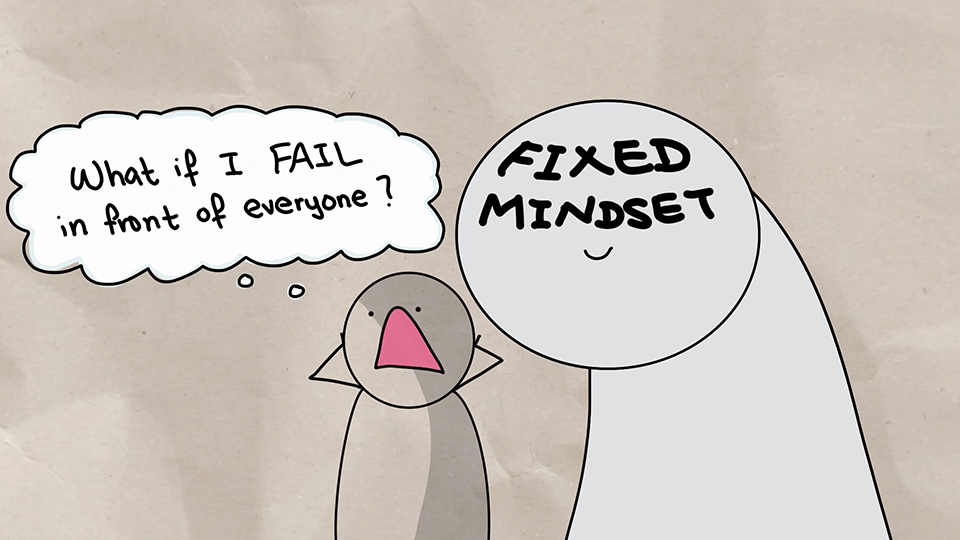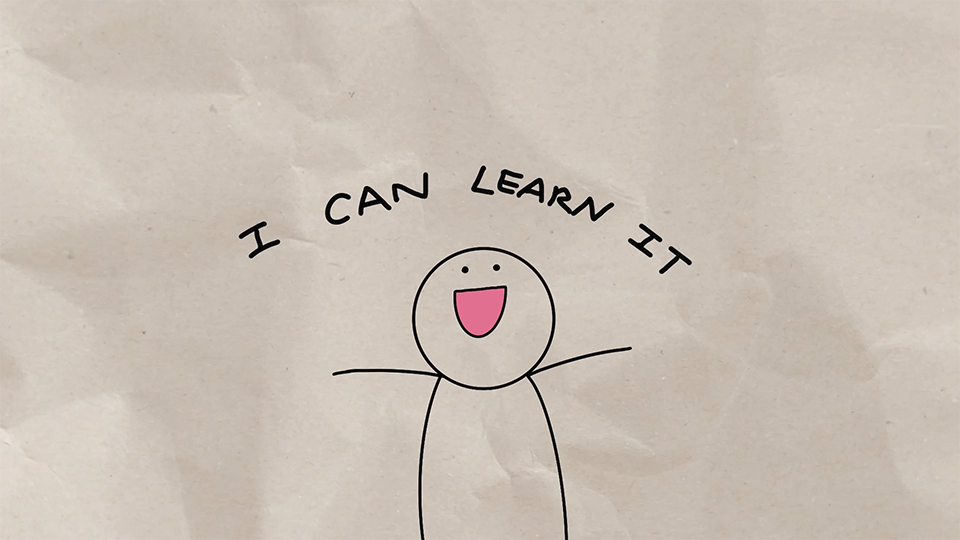What are fixed and growth mindsets?
You decide to follow your colleague's suggestion to learn about mindset. Remember that mindset is how you perceive your abilities. The two types of mindset are fixed and growth.
To learn more about how you can cultivate a growth mindset, review this video, which is about four minutes long:
Reflection
After reviewing the video, take a few minutes to think about your answers to the following questions. Optionally, note your responses on a device or on paper.
What did you learn about growth mindset from the video that shifts your perspective?
What's one area you'd like to work on to have a stronger growth mindset?
Examine the fixed mindset
A fixed mindset is an assumption that character, intelligence, and creative ability are static givens that can't be altered. A fixed mindset is a belief that people are born with certain abilities that they can't change. For example, a person with a fixed mindset might think "I'm not a tech person."
When you have a fixed mindset, new situations reveal what your abilities are. Each situation becomes a test that reveals the skills that you were born with based on how you perform:
If you do well, you were meant to do it. You were born with that ability.
If you don't do well, you weren't meant to do it. You weren't born with the ability.
You then categorize every situation as something you either can or can't do. You respond to situations with either "Yes, I can do that" or "No, I can’t do that."
Having a fixed mindset also means that you seek validation and approval from others. Because of that mindset, you might cling to what you're already good at and avoid risk and spontaneity. Risk and spontaneity create a higher chance of failure, and therefore, judgment. Eliminating experimentation and risk can prevent effective learning and growth. Inner dialogue like "Will I succeed or fail?" or "Will I seem smart or dumb?" creates a barrier to developing your potential.

Tip
You can recognize what kind of mindset you have in various circumstances by becoming aware of your inner dialogue, or thoughts. This dialogue is sometimes called self-talk.
Examine the growth mindset
A growth mindset is a mental attitude that you can learn anything you don't know and that you can improve your abilities through dedication and hard work. With a fixed mindset, you think you have an ability or you don't. With a growth mindset, the qualities and talents you develop early on are only your starting place. At the heart of growth mindset is a passion for learning, not a hunger for approval. People with this mindset aren't discouraged by failure. They see themselves as learning.

When you believe your abilities can grow, you're more likely to:
Try challenging problems.
Complete challenging classes.
Practice with the goal to improve.
Feel more confident.
Recover from setbacks and mistakes.
Here are several examples of inner dialogue that indicate a growth mindset:
"With time and effort, I can improve."
"Failure is an opportunity to grow."
"I’m new to technology, and I’m on my way to becoming a tech person."
"I haven’t worked much with hardware, but I’m eager to learn."
"This is unfamiliar for me, and I’m not yet sure how I feel about it."
Adopt a growth mindset to learn in technology
Research has demonstrated that having a growth mindset toward learning can improve your resilience and ability to succeed. In fact, many experts refer to the growth mindset as a learning mindset because it's crucial for effective learning.
Having a growth mindset is crucial in technology because of the need to:
Work effectively with others.
Learn new technology frequently.
Adopt a growth mindset when faced with challenges
A hallmark of the growth mindset is stretching yourself even when something isn't going well. A growth mindset thrives on challenges and sees failure not as evidence of unintelligence but a springboard for growth. When you have a growth mindset and you make a mistake or perform poorly, you consider the situation an opportunity for learning and development. You consider mistakes an inevitable and essential part of the learning process.
Contrast the following two inner dialogues you might have after you've made a mistake:
With a fixed mindset: "I really failed at this. I’ll never get it."
With a growth mindset: "Mistakes mean that I’m learning. I'm making progress to develop this skill."
Tip
Don't be afraid to redo, revise, or start over. Many professional writers create so many versions of a document that by the time it's finished, it's almost a different document than the one they started with. The process of writing and rewriting is what makes the final version so much better than the first.
Explore growth mindsets in technology with the following examples of growth mindset inner dialogue.
| Challenging task | Growth mindset | Explanation |
|---|---|---|
| Coding | "Writing this code is hard, but I enjoy solving the challenges as they come up. It's great to be learning so much." | Learning motivates this person. They celebrate small successes. |
| Conducting a training session | "I've never conducted a training session before. With my teammates' help, I know I'll be able to do this even though I know I'll make some mistakes." | This person acknowledges that it's a new skill but knows they can learn new skills with some help. They know they'll make mistakes but are still confident of success. |
| Learning a new coding language | "I was nervous when I started to learn JavaScript. Now that I'm getting better, every time I run a small script and it's successful, I do a little happy dance." | This person didn't let their nervousness stop them from learning a new skill. They also celebrate small successes. |
Adopt a growth mindset for inspiration
A growth mindset allows you to find inspiration in the success of others. Understanding that there will always be people with lesser and greater abilities than yourself, you can avoid comparing yourself to others. These comparisons consume time and energy, and they're not an accurate way to measure your progress. A growth mindset includes measuring your progress based on where you started rather than where someone else is in comparison to you.
You can learn from others who are successful by asking "How did you achieve your success?" and "How did you accomplish that goal?" If someone in your peer group or a mentor experiences success, you might be able to learn new skills from that person directly. If the person is well known, they might have an online video, book, or other tool you can use to learn the skills, approach, perspective, and methods they used to achieve success. You might also learn about the mistakes they made and how they learned from them. That knowledge can help you when you come across similar situations in your own journey.
Note
Remember that, although your success depends on your own efforts, asking for help can be crucial to learn what you need to learn. Every accomplished person was once a beginner, and most (if not all) people who have a success story will tell you that mistakes and asking for help were part of that story.